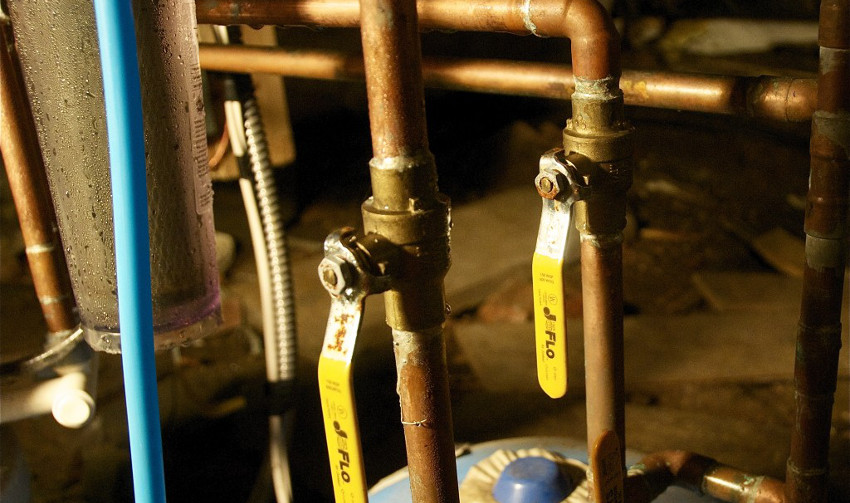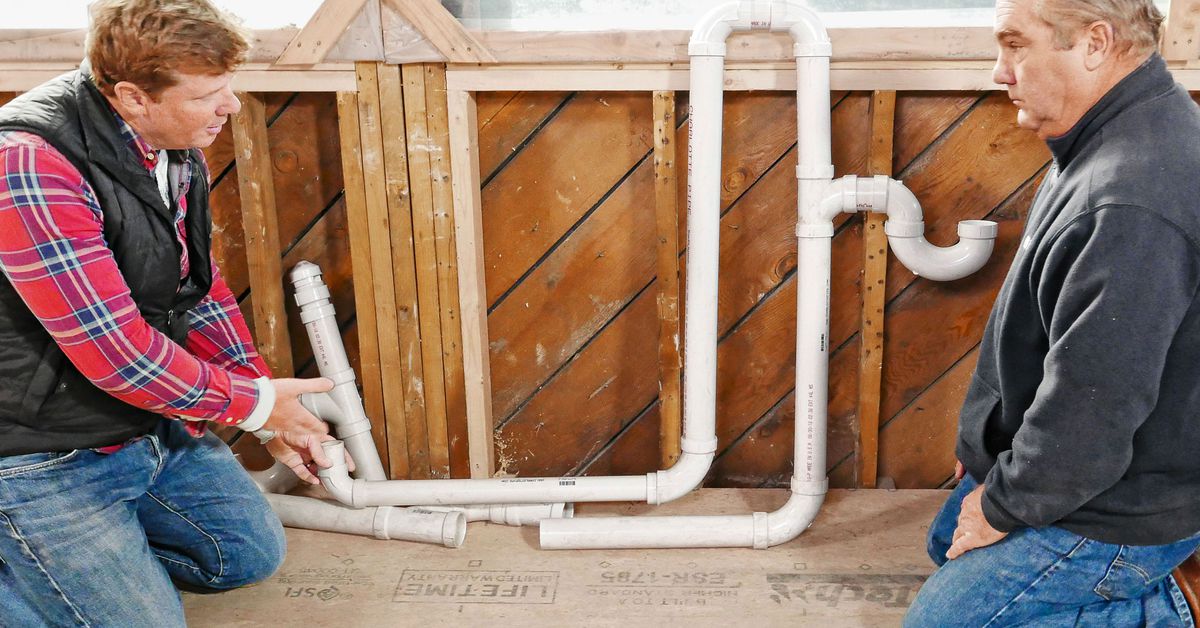When Appliances Go Awry: Usual Issues That Need a Plumbing Professional's Expertise
When Appliances Go Awry: Usual Issues That Need a Plumbing Professional's Expertise
Blog Article
Listed here below you might get more quality insight about How To Fix Noisy Pipes.

To diagnose noisy plumbing, it is important to determine initial whether the undesirable audios happen on the system's inlet side-in various other words, when water is turned on-or on the drain side. Sounds on the inlet side have varied causes: excessive water pressure, used shutoff as well as faucet parts, improperly connected pumps or various other devices, inaccurately put pipe fasteners, and plumbing runs containing way too many limited bends or other limitations. Noises on the drainpipe side generally come from bad location or, as with some inlet side sound, a design including tight bends.
Hissing
Hissing noise that takes place when a tap is opened somewhat generally signals too much water stress. Consult your regional water company if you suspect this trouble; it will certainly be able to inform you the water stress in your area and can mount a pressurereducing valve on the incoming water pipeline if required.
Other Inlet Side Noises
Squeaking, squeaking, scratching, breaking, as well as touching typically are brought on by the growth or tightening of pipes, generally copper ones supplying warm water. The noises take place as the pipes slide versus loose bolts or strike neighboring house framework. You can frequently determine the location of the trouble if the pipes are subjected; just comply with the audio when the pipes are making sounds. More than likely you will find a loosened pipe wall mount or an area where pipes exist so close to flooring joists or various other framing items that they clatter against them. Connecting foam pipeline insulation around the pipes at the point of get in touch with ought to treat the problem. Make sure bands and wall mounts are protected and also provide sufficient support. Where feasible, pipe bolts should be affixed to huge architectural elements such as foundation wall surfaces instead of to mounting; doing so lessens the transmission of resonances from plumbing to surface areas that can enhance and also transfer them. If connecting bolts to framing is inevitable, cover pipes with insulation or various other resistant material where they speak to bolts, and also sandwich the ends of new fasteners in between rubber washing machines when mounting them.
Correcting plumbing runs that struggle with flow-restricting limited or countless bends is a last resort that should be carried out only after seeking advice from a knowledgeable plumbing contractor. Regrettably, this circumstance is relatively usual in older houses that may not have been constructed with interior plumbing or that have seen several remodels, particularly by novices.
Babbling or Screeching
Intense chattering or shrieking that happens when a shutoff or tap is activated, and that typically vanishes when the installation is opened totally, signals loosened or malfunctioning internal parts. The service is to replace the valve or tap with a brand-new one.
Pumps and also devices such as cleaning machines and dish washers can move electric motor sound to pipelines if they are incorrectly linked. Link such items to plumbing with plastic or rubber hoses-never rigid pipe-to isolate them.
Drainpipe Noise
On the drainpipe side of plumbing, the principal objectives are to get rid of surface areas that can be struck by dropping or hurrying water as well as to protect pipes to include unavoidable sounds.
In brand-new building and construction, bath tubs, shower stalls, bathrooms, as well as wallmounted sinks and basins need to be set on or versus durable underlayments to decrease the transmission of sound through them. Water-saving commodes and also faucets are less noisy than traditional models; mount them as opposed to older kinds even if codes in your area still permit using older fixtures.
Drains that do not run up and down to the cellar or that branch right into horizontal pipe runs supported at floor joists or other framing present particularly frustrating sound issues. Such pipes are large enough to emit substantial resonance; they also carry substantial quantities of water, that makes the circumstance worse. In brand-new building, specify cast-iron soil pipelines (the huge pipes that drain commodes) if you can manage them. Their massiveness has much of the noise made by water travelling through them. Likewise, stay clear of directing drainpipes in wall surfaces shared with rooms as well as rooms where individuals collect. Walls containing drains must be soundproofed as was described previously, utilizing double panels of sound-insulating fiber board as well as wallboard. Pipes themselves can be covered with special fiberglass insulation made for the function; such pipes have an invulnerable vinyl skin (often containing lead). Outcomes are not always adequate.
Thudding
Thudding noise, commonly accompanied by shuddering pipelines, when a tap or device shutoff is shut off is a problem called water hammer. The sound and resonance are brought on by the reverberating wave of stress in the water, which all of a sudden has no area to go. Often opening a shutoff that releases water rapidly right into a section of piping consisting of a constraint, elbow joint, or tee installation can produce the exact same problem.
Water hammer can usually be treated by mounting fittings called air chambers or shock absorbers in the plumbing to which the issue shutoffs or faucets are linked. These gadgets permit the shock wave created by the halted circulation of water to dissipate airborne they contain, which (unlike water) is compressible.
Older plumbing systems may have brief upright sections of capped pipe behind wall surfaces on tap runs for the exact same objective; these can eventually fill with water, minimizing or damaging their effectiveness. The remedy is to drain pipes the water supply entirely by shutting off the primary water system shutoff as well as opening up all taps. Then open the primary supply shutoff and also shut the faucets one at a time, starting with the tap nearest the shutoff and also finishing with the one farthest away.
Pipe Down! What to Do About Noisy Water Pipes
Banging
Does it sound like someone's hitting your pipes with a hammer every time you run water? The issue could be a phenomenon called water hammer, which happens when a water valve closes suddenly. You'll often hear it when your washing machine stops filling, for example. The momentum and pressure from the water flowing toward the valve create the shockwave that causes the banging noise when the valve closes suddenly. It might not seem like a big deal, but water hammer can cause damage to your pipes, including leaks and joint damage.
One way to ease water hammer is by installing water hammer arrestors. Your plumber can install them near major valves to help cushion the shock of the water when it suddenly stops or changes direction. You might also need to reduce the water pressure coming into your home with the pressure-reducing valve.
Gurgling
Gurgling sounds typically come from drainpipes. This sound happens when the water can't drain properly, usually when there's a clog in the water pipes. Drain clogs often happen due to hair, grease, soap scum or objects that fall down the drain. They can happen suddenly or build up slowly over time.
You can sometimes clear a clogged drainpipe with a plunger to help force the clog through the pipe. A plumbing snake or an auger can also help break up tough clogs. A common plumbing myth is that chemical drain cleaners are safe and effective, but they often don't work and contain harsh chemicals that can hurt you and your plumbing. If you can't remove the clog with a plunger or snake, it's best to call a plumber to help.
Rattling
Water travels through your pipes with lots of pressure, so the pipes are bound to move a little. Pipes should be secured well to keep them from moving too much when water runs through them. If they're not properly fastened or the fasteners come loose, you might hear them rattling when you run water.
Resecuring the pipes can cut down on the rattling noise and prevent damage to the joints of the water pipes. However, many pipes run behind walls where you can't easily access them. A plumber can help determine if loose fasteners are the cause of the rattling and resecure them if necessary.
Humming
If your pipes sound like they're humming, it's likely a water pressure issue. When the water pressure is high, it can cause the water pipes to vibrate and create a humming sound. High water pressure is more common if you have a well for your water, but it can happen with municipal water as well. High water pressure can damage your plumbing and cause leaks.
If you have a well, check the pressure to ensure it's below 55 pounds per square inch. A plumber can test the pressure for you and help adjust the issue if you're not sure how to do it yourself. If you're connected to the municipal water source, your home likely has a pressure-reducing valve near where the water enters your home. You can adjust the screw in the valve to decrease the pressure, but be careful not to lower it too much.
Squeaking
Squeaking or squealing is another common sound you'll hear in your water pipes. This often happens if small components within the plumbing, such as washers or aerators, become loose, dirty or damaged. When this is the cause, the squeaking sound is usually confined to a certain fixture or area of plumbing. Replaced or repairing the part should solve the noise.
If you can hear the squealing sound everywhere in your home, it could be an issue with water pressure. Buildup in the pipes narrows the space for the water, which can cause squealing as the water tries to squeeze through the pipes. Wear and tear on the plumbing system can also cause whistling or squeaking. These situations typically require a professional plumber to diagnose and repair.
https://www.homeserve.com/en-us/blog/home-improvement/water-pipes-making-noise/

As a keen person who reads on Why Your Water Pipes Are Noisy and How To Shut Them Up, I figured sharing that excerpt was mandatory. Appreciated our posting? Please share it. Help somebody else discover it. Many thanks for going through it.
Customer Reviews Report this page